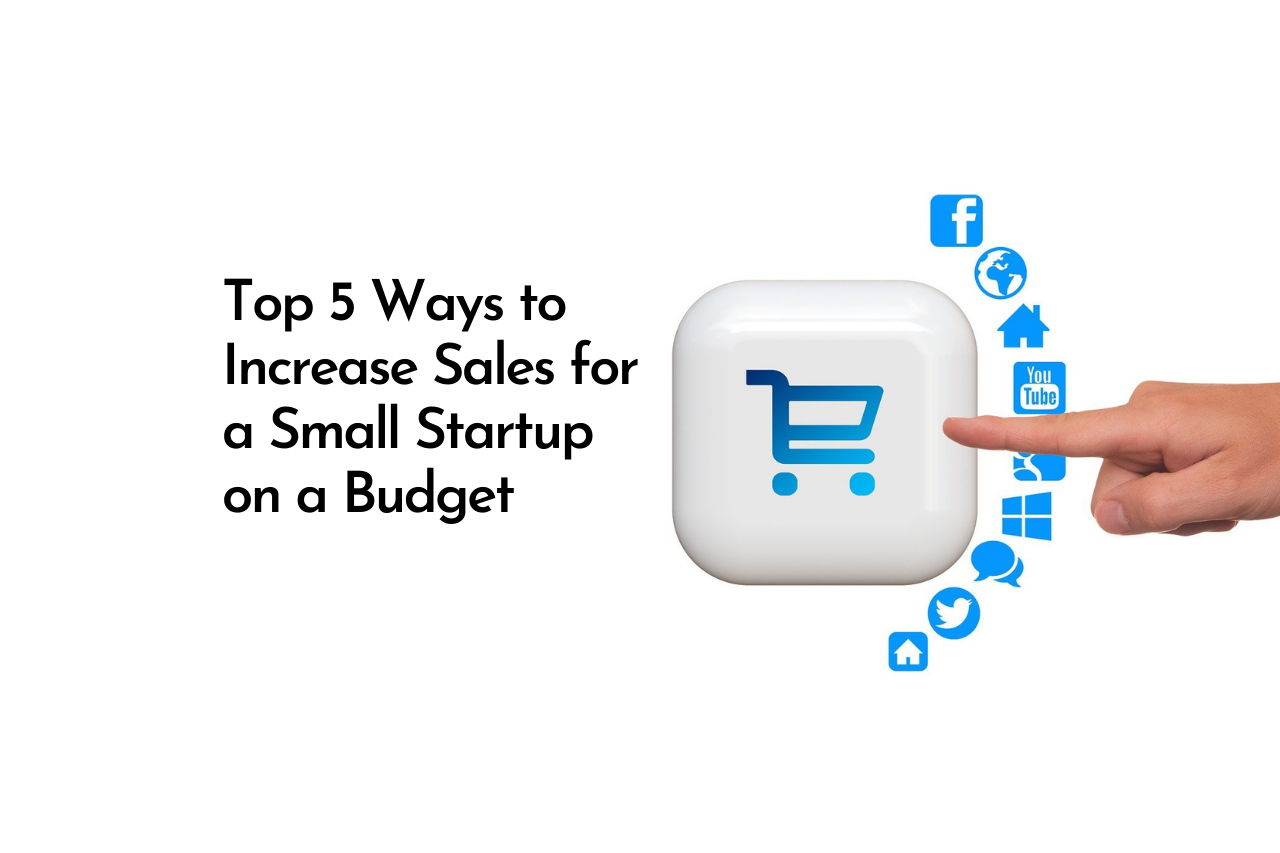In the last few years, the startup ecosystem has evolved so dramatically that almost all markets have been poorly intensified, and all startups in those markets are struggling to cope with losing sales. However, in some markets, the situation could be better so that there is more room left for a new startup and space for old startups to increase sales.
However, some of the most groundbreaking technologies are available in the market, and many new startups are employing these technologies to increase sales. Though some of these technologies are costly, they are less expensive than what a startup loses without these technologies.
Table of Contents
So, in this blog, I will list those technologies and five ways startups are increasing their sales.
They customize services/products according to the market
Every market has its characteristics, and startups should know about them before even launching their product/service in that market. A startup needs to identify the unique features of a call to impress the users of that market, which eventually affects the sales of that startup in that particular market. But if a startup identifies the characteristics of the market, it can customize its service/product according to the requirements of users of that market.

For instance, when Uber launched its services in Bangladesh, it identified the users’ requirements and customized its significant benefits. As a result, Uber added a new motorbike taxi service, helping Uber to witness the highest-ever sales numbers in Bangladesh.
They introduce premium services
When more people prefer a product/service, sales increase automatically, and people like a product/service when they hear good things about it; big tech startups introduce premium services for a particular group of people. Since it is a premium service, it should impress people who later spread knowledge about such a premium service and the company offering it. And when many users hear good things about the company’s premium service, they get attracted to the company offering premium service, which eventually increases sales.

The airline industry works purely on this business model. They promote their business class seats more often than the economy class seats as passengers traveling in business class promote the services offered in business class. As a result, other people get attracted to the airline, thinking about how good this airline is!
They offer dedicated features for each user group
Except for a few startups, almost all startups serve their products/services to many user groups, and unfortunately, the characteristics and requirements of all user groups are different. Therefore, with the same feature set, a startup can only satisfy the needs of some user groups. In other words, by offering the same features to all user groups, a startup only meets the requirements of a single user group and gives the cold shoulder to different user groups.

Successful startups identify each user group, list their requirements, and integrate dedicated features in their mobile apps or web applications. For instance, Lime, the unicorn e-scooter sharing company, has recently rolled out a group booking feature for university students who generally travel with their friends in the group!
They employ AI to run marketing campaigns effectively
Every startup spends a lot of money from initial funding on marketing. Though they run a marketing campaign aggressively, they generally convert only a few people into users. An ineffective marketing campaign makes a startup run out of money and leads it to a dead end.

Successful startups also run marketing campaigns, but they are very effective. They employ AI to identify the behavior of users & interests of users, create custom content, and run a personalized marketing campaign. Since it is a customized marketing campaign and an ad of the startup only reaches interested users, a startup is more likely to get more users while spending significantly less.
Many free AI-based marketing tools are available in the market that you can use to increase sales.
They study the heat map and redistribute their resources according to demand
Resource management is the major challenge all startups face. But unfortunately, many startups allocate their significant resources to unnecessary things, affecting customer experience. For instance, if a startup has a staff of 100 people, and it gives 80 of them to monitoring and only 20 for customer service, which of course, needs more people than monitoring, many people who raise queries do not get an answer on time.
The situation gets worse when a startup is running its business in Uber-style. For instance, for a startup with many costly resources like taxis, e-scooters, and food delivery executives, proper distribution of the resources is the fundamental requirement to satisfy the demand. Big tech startups that are tasting success manage their resources very effectively. Talking about Uber, it’s a perfect algorithm that calculates the order and asks Uber drivers to serve in that location to satisfy the demand. Many big e-scooter-sharing companies have also integrated an AI-based heat map with the help of top e-scooter app development companies. This heat map shows startups needing e-scooters in a particular area, and then startups redistribute their e-scooters according to the market.
With some help from your hired mobile app development company, you can add a heat map in your admin panel and manage resources effectively. This step will increase the number of user requests you can satisfy, eventually increasing sales.
In a nutshell
The startup is a tricky ‘business.’ Every startup entrepreneur needs help to earn enough to be profitable. However, a few startups have developed strategies to lock horns with the overly intensified market to increase sales. Their plans are very, very unique. Of course, many newbie entrepreneurs must know big startup strategies to increase sales. But we have listed some of them in this blog. All these ways startups are growing their sales are legal and genius, and you can also apply the same things to your startups to experience the same.


Winston here from Iowa. I just wanted to see if you would like any extra targeted traffic or web help in any capacity, no matter what it takes from my end. I’ve been doing this for over 22 years and love it – social growing on autopilot, bulk email campaings using my addresses I have (over 400 million), programming, AI integrations to automate anything you can think of, etc. I even have ways to make interactive emails/web landing pages/areas on your own site.
It amazes me that no one else is doing this quite like I do. No cost on my end for 90% of this except for my time starting at 99 a month. I have quite a few ways I can set all of this up and do this for you at no cost to you except my time. I don’t mean to impose, I was just curious.
So if you need any extra help in any capacity please let me know as I have a LOT of ways I can get targeted traffic to your site from anywhere in the country. Let me know either way as I value your time and don’t want to pester you.
All the best,
Winston
Cell – 1-319-435-1790
Site – https://cutt.ly/9wEWIZbQ
chat with me: – https://goo.gl/5sbTx5
The future has landed with AI Disruptor 2.0! A product that’s revolutionizing the way we succeed, making money easier and more enjoyable for all.
The future is here, and it’s time to seize it: https://cutt.ly/1wRyhaf1
You can do it from ANYWHERE with NO upfront cost!
This is novel, it is actually fun, you can do it with the family and with AI it makes the products for you and delivers them to 400 Million people every month. You do not need to do anything except grab AI Disruptor 2.0 now https://cutt.ly/1wRyhaf1
Looking to create a better lifestyle from the comfort of your own home, and increase personal freedom at the same time? If so, then I have something I’d like to show you. We have developed a proven system that can help you make your first commissions within just 48 hours, even if you have zero tech skills or prior experience.
Done For You – https://cutt.ly/RwZiXgwE
Imagine being able to work from home, set your own schedule, and earn money while pursuing your passion, whatever that might be. Our program provides you step-by-step guidance and support to help you succeed. You’ll learn how to leverage your existing skills, and even learn new ones, to create a profitable and sustainable online business.
Don’t miss out on this incredible opportunity. Take the first step towards financial freedom and sign up for our program today. Let’s make your dreams of a passive income lifestyle a reality.
Best regards,
Peter Neale
Winston here from Iowa. I just wanted to see if you’d like any extra targeted traffic or web help in any capacity – no matter what it might be. Bulk targeted email/messaging campaigns across the country to hundreds of millions of businesses or consumers at no cost to you, social growth on autopilot, programming, video/site creation/editing, AI integrations to automate anything you can think of, remove negative listings, consolidating all of your hosting/emails/ssl certificates under one provider that charges $5 a month for unlimited everything, no joke. The list goes on. I’ve been doing this for over twenty two years and love it.
There’s virtually no cost on my end to do any of this for you except for my time starting at around 3 dollars a day. I don’t mean to impose; I was just curious if I could lend a hand. Brief history, I’ve been working from home for a couple decades now and I love helping others. I’m married, have three girls and if I can provide for them by helping you and giving back by using the tools and knowledge I’ve built and learned over the years, I can’t think of a better win-win.
It amazes me that no one else is helping others quite like I do and I’d love to show you how I can help out. So, if you need any extra help in any way, please let me know either way as I value your time and don’t want to pester you.
PS – If I didn’t mention something you might need help with just ask, I only mentioned a handful of things to keep this brief 🙂
All the best,
Winston
Cell – 1-319-435-1790
My Site (w/Live Chat) – https://cutt.ly/9wEWIZbQ
My last living salary full-time employment was terminated early 2021 after being partially disabled due to being rear-ended in 2019 car accident. This has left me supporting my family of three without steady income flow and with mounting medical costs in treatments and recovery.
Additionally, my wife and daughter were hit by another car recently at night September 14, 2023, increasing our medical costs. Thankfully, the airbags saved their lives. My life has been a testimony of seeing the reality of I Corinthians 15:58 displayed in thousands of lives and witnesses, largely due to my parent’s faithful testimony and character as they pastored numerous churches and camping ministries.
I am very grateful for this platform and the ability for believers to respond as prompted in God’s love. All I ask for is your prayers and support – when you get a minute, please take a look at what I’ve setup here – https://givesendgo.com/familymedicalrecovery?utm_source=sharelink&utm_medium=copy_link&utm_campaign=familymedicalrecovery
Thank you.
Mark Phillips & Family